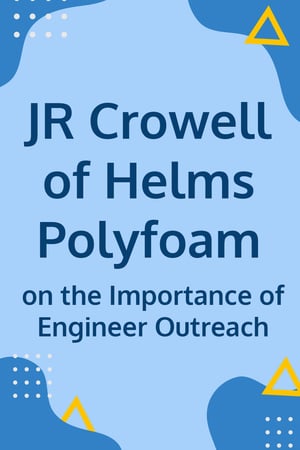
 This article is an excerpt from Episode 5 of Alchemy-Spetec's podcast The Injection Connection, featuring JR Crowell and Morgan Helms of Helms Polyfoam. The Injection Connection is hosted by Jim Spiegel: Vice President of Alchemy-Spetec and Board Member at the International Concrete Repair Institute. (If you'd rather listen, an audio version of this exchange is posted at the bottom of the article.)
This article is an excerpt from Episode 5 of Alchemy-Spetec's podcast The Injection Connection, featuring JR Crowell and Morgan Helms of Helms Polyfoam. The Injection Connection is hosted by Jim Spiegel: Vice President of Alchemy-Spetec and Board Member at the International Concrete Repair Institute. (If you'd rather listen, an audio version of this exchange is posted at the bottom of the article.)
Jim Spiegel: Do you guys do quite a bit of engineer outreach?
JR Crowell: Yeah. That’s probably where I spend the majority of my time. I love engineers because they love to learn. They're extremely open to us coming in and talking about what we do because it is exciting stuff. It's a neat process, with neat products and you're solving some huge issues. I love talking to them because they ask a lot of questions. For us, as a company going after innovative repair projects, it certainly helps when we can pick the brain of a hundred engineers a year or better and make sure that we're doing everything that we need for them to spec a project.
Jim: Is that one of the metrics that you look at as far as your sales KPIs? Along with the number of calls, average ticket price, close rate, do you also look at engineer presentations?
JR: Yeah. At the end of the year, we'll break down where our revenue came from and we certainly measure the engineering piece. You'll have some projects that are right there and you'll have a lot of them that come maybe a year, two years down the road. They just don't need you till they need you. But then, when they do, they remember the company that came in and tried to educate them a little bit and stayed in touch with them.
Jim: Yeah, you nailed it. I think the end game with the engineer effort really is two, three, even longer years out sometimes.
JR: I think it takes a while just like when a new contractor starts out, he has to figure out what all he could do with polyurethane. And so, these engineers are the same way. We get a lot of calls for the first month or two just testing, “Hey, is this a good opportunity? What do you think about this? Come look at that.” Then when you finally get a product or process that's "ginning" if you will, they already know what to call you in on, so they’re not wasting your time either. But we've got some that we work with so much now, they'll call us and say, “We're thinking about doing this. Is there anything you have that would be better? If so, I'd love to hear about it.” They've kind of started calling us pre-job, pre-spec, pre-bid.
Jim: That's the table you want to be at.
JR: That's right.



